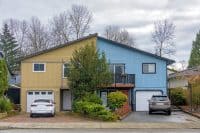
The 2023 U.S. Home Equity & Underwater Report shows that some U.S. homes have underwater mortgages. This is “a combined estimated balance of loans secured by the property of at least 25 percent more than the property’s estimated market value.” As interest rates rise and affect many homeowners, those who own these homes face serious problems. They are supporting homes on which they may never make any money. In the past, this has been a reason for mortgage defaults. (What you need to earn to be middle class in your state.)
[in-text-ad]
The people with underwater homes face a difficulty most homeowners do not have. Almost half the homes in America are considered equity rich, which means the “combined estimated amount of loan balances secured by those properties was no more than half of their estimated market values.” Only 3% of Americans have underwater mortgages.
The study looked at 107 markets with populations of over 500,000. Among these, Baton Rouge had the highest percentage of homes with underwater mortgages at 10.8%. Indianapolis followed this at 8.6%. Next was New Orleans (7.2%), Syracuse (6.1%) and Scranton (6.0%). These cities have one thing in common. Their populations are poor.
In Baton Rouge, 37% of the population is white and 52% is Black. The median value of a home is $191,000, well below the national average.
Baton Rouge has a median household income of $46,000, well below that national number. The poverty rate is 24%. Presumably, home values in the city have fallen sharply to create the underwater mortgage problem. Or, banks made aggressive loans in comparison to the value of homes. Either way, in the poorest cities, residents will find it hard to solve their mortgage problems.
The Average American Has No Idea How Much Money You Can Make Today (Sponsor)
The last few years made people forget how much banks and CD’s can pay. Meanwhile, interest rates have spiked and many can afford to pay you much more, but most are keeping yields low and hoping you won’t notice.
But there is good news. To win qualified customers, some accounts are paying almost 10x the national average! That’s an incredible way to keep your money safe and earn more at the same time. Our top pick for high yield savings accounts includes other benefits as well. You can earn up to 3.80% with a Checking & Savings Account today Sign up and get up to $300 with direct deposit. No account fees. FDIC Insured.
Click here to see how much more you could be earning on your savings today. It takes just a few minutes to open an account to make your money work for you.
Our top pick for high yield savings accounts includes other benefits as well. You can earn up to 4.00% with a Checking & Savings Account from Sofi. Sign up and get up to $300 with direct deposit. No account fees. FDIC Insured.
Thank you for reading! Have some feedback for us?
Contact the 24/7 Wall St. editorial team.
 24/7 Wall St.
24/7 Wall St.

